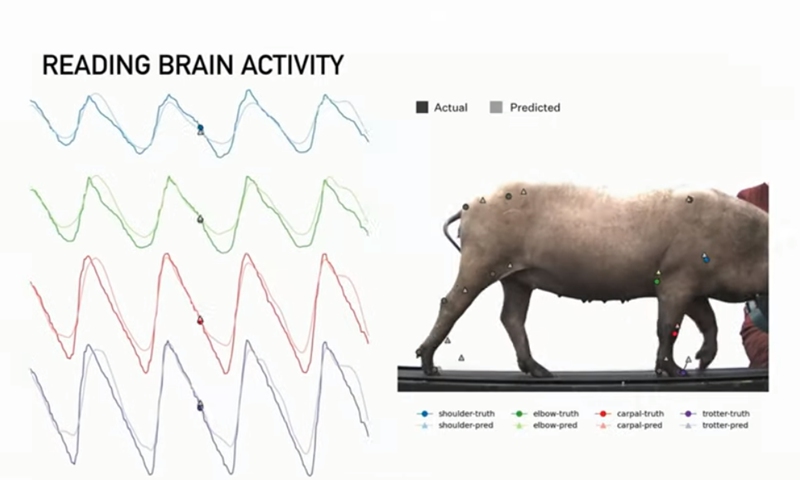
Photo: Screenshot of Neuralink product demo
Neuralink, American tech giant Elon Musk's neurotechnology company, demonstrated prototypes for its brain-computer interface devices for the first time on Friday, causing heated discussion on Chinese social media platforms with some netizens and experts hailed its fast improvement while others are disappointed saying the demonstration is more like a large "job fair."
Musk presented the newly developed chip with three pigs during the live stream event. As a pig named Gertrude, which is said to have had the chip implanted in its head, ate, walked, and snuffled around, Neuralink's computing device showed its brain activity, according to Musk.
Brain-computer interface (BCI) is a direct communication pathway between a brain and an external device. As small as a coin, Neuralinks's new chip is designed to be implanted in the brain by a surgical robot without general anesthesia, which allows one's brain activity be perceived through an external receiver.
"It's like a Fitbit in your skull with tiny wires," explained Musk.
Neuralink was co-founded by Musk in 2016 to create a wireless BCI, and applied to conduct human trials in 2019. In July, it received a "Breakthrough Device" designation and is working with the US Food and Drug Administration (FDA) on future trials involving people, said Musk.
Musk said Neuralink is working on devices that can repair brain and spinal injuries, adding that research shows brainwave data can be controlled. Neuralink has now proven that it is possible to implant a chip in human brain by collecting data from more than 150,000 people.
Ma Qingguo, head of the Academy of Neuroeconomics and Neuromanagement at Ningbo University, recognized the significance of Neuralink's advances in BCI chip technology and its promising prospect, but added that research in this area requires a solid foundation, and "Musk's publicity makes it look like it's progressing fast."
Neuralink has made significant progress on two fronts: the minimally invasive surgical robot has been greatly improved; and the miniaturization and wireless transmission design of the implanted device has been improved, Hong Bo, a professor at the department of biomedical engineering at Tsinghua University in Beijing, was quoted as saying by Tencent Technology.
Hong was disappointed the new BCI chip showed no progress in neural signal decoding, and indicated only a simple demonstration of limb movements and nerve discharges in the brain. "There is still a long way to go before actually implanting BCI chips in humans and connecting them to cell phones," he said.
"Musk's presentation shows his lack of attention to neural signal coding," Hong noted. "The live stream demonstration is more like Neuralink's job fair."
On Thursday, BrainCo, a Chinese brain-machine interface startup, also unveiled its latest achievements. Unlike Neuralink's invasive brain-machine interface technology, BrainCo works to read information from an EEG through non-invasive methods to reach the goal of connecting brains to the world.
Ma said the development of BCI technology in China and the US each have their own strengths. "We have different technical solutions and different focuses," Ma told the Global Times on Sunday. "More Chinese scientists than Americans are working on non-invasive BCI technology."
Netizens split over Musk's latest experiment. Some hailed him as a pioneer in the exploration of human technologies, while others find him an over-confident braggart.
One netizen wrote on Weibo, Chinese Twitter-like microblogging platform, "This is exciting but at the same time upsetting. Countries should legislate BCI early."




